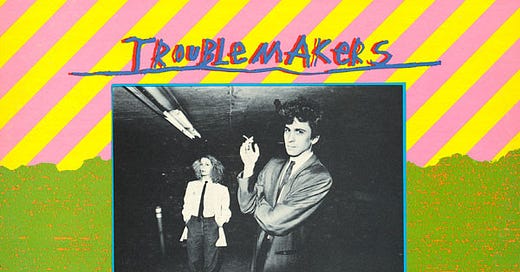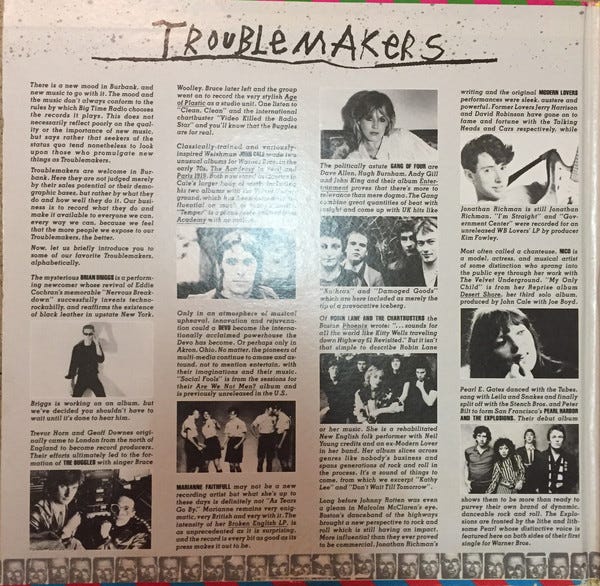Troublemakers, Part II
Hello, and welcome to New Directions in Music. This week features the conclusion of my two-part piece on the final release in the Warner Loss Leader series, Troublemakers.
You can access the complete Troublemakers playlist by clicking here for Spotify, or by clicking here for YouTube.
Jon Savage said that Joy Division was not a punk band but that they were inspired by its energy. People got tired of a few chunky chords and recycled guitar riffs badly played but they did like the energy the new music produced. The music industry needed a handy genre designation for this music, and so it became 'new wave.' Unfortunately, in the words of Claude Bessy, editor of Slash magazine and sometimes punk singer, 'new wave doesn't mean shit.' But the music being created by bands like Joy Division, Gang of Four, and Public Image Limited earned the moniker 'post-punk', leaving new wave for the more pop-oriented, less abrasive acts.
Both Andy Gill of Gang of Four and Keith Levene of Public Image played a different style of guitar from what had typically been heard in rock music before. They eschewed the buzzsaw chords of punk groups like The Ramones and Buzzcocks, playing instead a style that was angular, abrasive, percussive, and left much more space for bass and drums. Some bassists were influenced by funk as Gang of Four's David Wolfson or by dub, like PiL's Jah Wobble. The two tracks on Troublemakers from Gang of Four's debut, "Damaged Goods" and "Love Like Anthrax," are representative of their sound as well as their lyrical outlook.
In fact, the songs were the band's first single, which is a good indication of how radical Gang of Four really was at the time. "Anthrax" is especially stunning, with Andy Gill opening with a room-clearing salvo of feedback that exists on its own terms, not acknowledging a song form or chords, or leading to anything that is the actual song. When the rhythm section comes in Gill lays out momentarily, only to return in the same style. It's as though Gill's guitar part is a form of energy that hangs over what the group is playing without being influenced by it in any way. While Jon King sings the song's lyrics, Gill takes to reading something of a manifesto simultaneously on the other channel, a nod to Godard's use of the split-screen technique in film. “I don’t think we’re saying there’s anything wrong with love,” Gill intones, “We just don’t think that what goes on between two people should be shrouded with mystery.”
Public Image Ltd was the new band formed by John Lydon (formerly Johnny Rotten) on the dissolution of the Sex Pistols. The band was supposed to be the next phase for Lydon, a band that was not punk and that would be what the Pistols were not, which is to say they would be a real band and they would move in a different direction, but the first album by the band, First Issue, contained both new ideas and rehashing of some old ones. The band did seem to be searching for new energy, and on the album's opening track, "Theme," they find a groove that will serve the band well in the future, with drums like waves constantly crashing the shoreline, Jah Wobble's dub-influenced bass, and Keith Levene playing guitar in the same kind of choppy, in your face, pure sound approach as Gill was exploring with Gang of Four. Other tracks, like "Public Image," which is included on Troublemakers, are punk songs with a little bit of artsy guitar thrown on top but honestly, it's the group's most Sex Pistols-like song.
PiL's sophomore effort, Second Edition, was released in 1978, and by the time they recorded it, they had developed the sound they were looking for. Levene, the band's co-founder, had also founded The Clash and convinced Joe Strummer to join, leaving before the band recorded a single note. Levene was also reinventing the language of rock guitar with his postpunk array of noise, feedback, and effects. Levene does sometimes resort to a bit of old fashioned strumming in order to build a certain energy, but the overall effect is one of sound shapes and single note figures. U2's Edge was definitely influenced by Levene's work on the early PiL albums.
Singer Pearl E. Gates was a backup singer/dancer with The Tubes, the theatrical San Francisco-based band, and then she became part of the San Francisco punk/new wave scene. Pearl Harbor and the Explosions were formed with guitarist Peter Bilt, and the Stench Brothers, John and Hilary, on bass and drums. Warner signed the band on the strength of their song "Drivin'" which sold 10,000 copies with no real marketing and became a radio staple around the Bay area. The song is ear-catching a low-key cool with its hi-hat driven beat, motorik bassline, and pentatonic melody, but what really makes it work is the juxtaposition of Bilt's clipped jazz-voiced chords on the verses with a more straight-ahead rock guitar on the chorus. At times the group sounds like an up and coming Police.
Unfortunately, there aren't a lot of other songs put together that well on the group's one and only album, and "Drivin'" is not included on Troublemakers. The song had already proven itself and so Warner features the album's second cut, "You Got It (Release It)" and a non-album B-side entitled "Busy Little B-Side." "You Got It" was originally released as the B-side of "Drivin'" when it was released on the local 415 Records label. It's a sunny piece of power pop that sounds about as 'alternative' as pumpkin spice. "Busy Little B-side" is a clever uptempo boogie about a hit song that emerges from a B-side record, a story that is ubiquitous in the canons of all popular music genres. Ultimately, the album sounds like many a local band that has a shot at the top of the charts but can't quite convert on the play. For that reason, it may give many listeners a shot of positive nostalgic feelings as they remember the local bands of their youth.
The Buggles were formed in 1977 and released their first album, The Age of Plastic, in January of 1980. The first single, "Video Killed the Radio Star" (included on Troublemakers) was a hit in the UK, allowing Geoff Downes and Trevor Horn to record an album. Shortly after this, the duo joined prog-rock band Yes to replace singer Jon Anderson and keyboard player Rick Wakeman. They completed the album Drama with Yes as well as touring with Yes in 1981. In August of 1981, the “Video Killed the Radio Star” became the first music video broadcast by U.S. MTV, securing its place as a cultural milestone.
The Age of Plastic is a good synth-pop album, one well worth listening to even now. The tracks run a large gamut of styles and the record is meticulously produced (Horn left Yes after the '81 tour to focus on production). "Clean Clean," the other Troublemakers track, starts out like a Billy Idol song and sounds much less dated than a lot of 1980s synth-driven music. Horn helped define the sounds of the '80s as a much sought after producer, while Downes has remained in the orbit of Yes.
Marianne Faithful is hardy a new wave artist, but her emergence with the 1979 album Broken English might as well have been her debut. After surviving a rough time of heroin addiction and homelessness that left her once-crystalline voice a hoarse croak, Faithful received a lot of attraction with the album that featured the songs "Why D'Ya Do It," "Ballad of Lucy Jordan," and John Lennon's "Working Class Hero," which is included on Troublemakers. The album's title track, also included here, featured Steve Winwood's bubbling keyboards. Winwood was brought in at the suggestion of producer Mark Miller Mundy in order to give the album a more modern and electronic sound. It obviously worked, as the album gave Faithful a huge comeback from which she was able to put together a new, post-'60s career.
Rounding out Troublemakers are single tracks by The Modern Lovers, Devo, Brian Briggs, and Nico (whose Desert Shore album is anything but new wave). Oh, and there are two tracks from a band called The Sex Pistols, who reportedly started this whole UK punk thing but then dissolved after one album. Personally, I find it difficult to even consider them a band, but in truth, many successful bands started out by being artificially constructed, so there you go. In any event, if you like the music of this time period Troublemakers provides a pretty solid listening experience and takes the Warner Loss Leader Series into new territory.
Bonus Tracks
Speaking of Gang of Four, Sasha Frere-Jones wrote a glorious piece in The New Yorker this past February when co-founder Andy Gill passed away. Gang of Four's Glorious and Dangerous Noise lets us in on the creation of the group's music and points the way to the reasons the group mattered and why they continue to be influential.
From the New York Times comes this just-published piece on fashion designer, artist, and photographer Anya Philips, who dressed NYC's punk, post-punk, and no wave musicians including Debbie Harry and James Chance as well as becoming an integral part of the scene before dying of cancer at age 26. This essay is part of a NYT series entitled 'Overlooked' which provides obituaries for people whose passing wasn't noted in the paper at the time of their death.
If you aren't familiar with the blog One Week // One Band, I suggest spending a little time there. A diverse group of fans, music writers, hobbyists, and others write about their favorite band, with each group getting one week and an assigned fan/writer/curator. This entry covering Clash bassist Paul Simenon and his song "Guns of Brixton" is representative, and I found it pretty interesting.
FromVice comes this story on how 18,000 musicians are demanding to earn a penny for each streaming instance of their music from Spotify, a move that would nearly triple the .0038 payout artists receive on average. The streaming service also faces demands to create a new payment system. This relates to Spotify's recent high profile acquisition of celebrity podcasts which suggested to some that the company has little plans to change its current platform to allow recording artists to earn fair compensation for their work. There is also this Baffler piece, entitled Podcast Overlords, which suggests that Spotify's podcasting model, just like their music model, only benefits the largest stars on the platform.
Let the reassessment begin! Any band or artist has certain periods, certain records, that are universally reviled at the time of their release. It might take ten years, maybe twenty, maybe fifty, but rest assured, the time will come when the work in question will no longer seem as outre or as bad as was first assumed. No Lou Reed album has been hated quite as vehemently as the last work he released, the collaboration with Metallica entitled Lulu. Steven Hyden kicks off the reassessment of this record with his Uproxx piece The Definitive Album Of 2020 Is Lou Reed And Metallica’s ‘Lulu’.
Leaving you this week with a 2015 performance by Hiromi Uehara and her amazing trio featuring Anthony Jackson on bass and Simon Phillips on drums.
Wishing you all a terrific week and lots of happy listening. See you next week with my monthly roundup of exciting new music.




